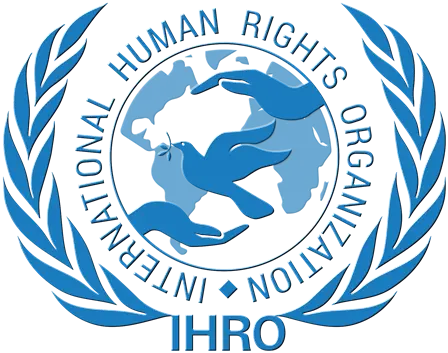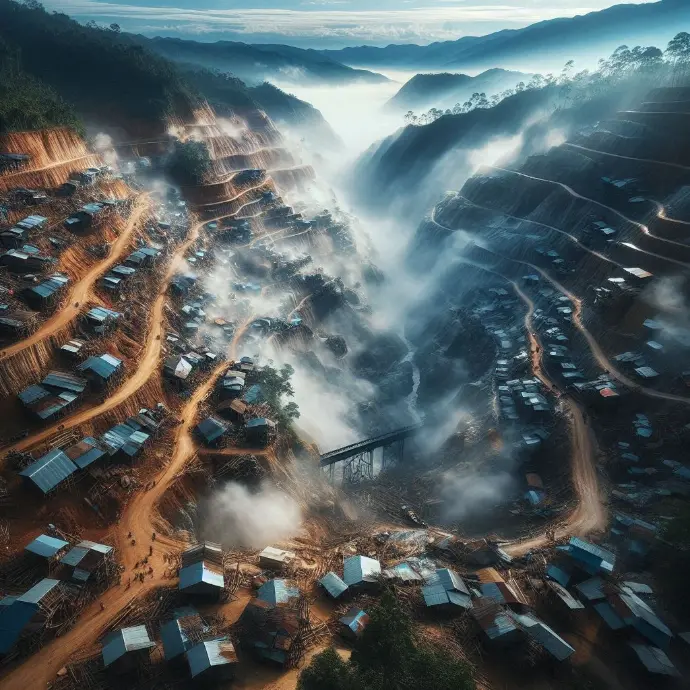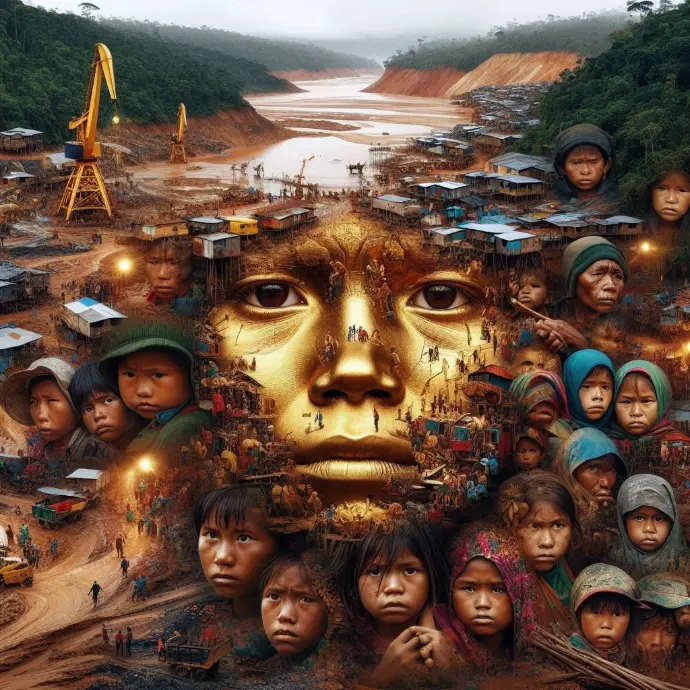In our feature article, "Displaced by Mining: The Silent Crisis of Environmental Refugees," we will explore in depth the shocking reality of environmental refugees generated by mining activities. What consequences does this problem have? How does it affect local communities? Prepare for an in-depth analysis that will open your eyes to a silenced crisis.

Introduction
Mining is an activity that, if not properly regulated, can have a significant impact on the human rights of local communities and the environment. It is important to conduct a thorough analysis of this issue to understand the magnitude of its effects.
Mining can have various negative impacts on human rights, such as the right to a healthy environment, the right to health, the right to participation and prior consultation of affected communities, among others. Mining operations often generate water and air pollution, soil degradation, and deforestation, which directly impact the quality of life of people living in areas near mining sites.
Furthermore, the presence of mining companies can lead to social conflicts and forced displacement of entire communities, exacerbating the vulnerability of these people and placing them in the category of environmental refugees. Constant monitoring of mining activities is crucial to ensure that the human rights of local communities are respected and the natural environment is protected.
Environmental refugees are people forced to leave their homes due to natural disasters or environmental degradation caused by human activities, such as mining. In the specific case of mining environmental refugees, these are individuals and communities forcibly displaced as a result of the pollution and environmental destruction caused by mining operations.
These environmental refugees face a series of challenges, including the loss of their livelihoods, the disruption of their community ties, and the impact on their physical and mental health. It is essential that their status be recognized and that they be provided with the necessary protection and assistance. Defining mining environmental refugees is crucial to raising awareness of this issue and adopting concrete measures for their protection.
The mining-related environmental refugee crisis is a phenomenon that has been occurring silently for decades, especially in countries with significant mining activity. Entire communities have been displaced, losing their homes, lands, and traditional ways of life due to the pollution and environmental degradation caused by mining.
These people, who in many cases are Indigenous or belong to ethnic minority groups, have faced difficulties in obtaining recognition as environmental refugees and in accessing humanitarian assistance and the protection of their rights. The lack of visibility of this crisis has contributed to its labeling as "silent."
It is critical that awareness be raised about this issue and that measures be taken at the national and international levels to protect mining-related environmental refugees and prevent future forced displacement.
The Problem of Environmental Refugees Due to Mining
Mining is an activity that can have devastating effects on local communities, especially those close to mining sites. Mineral extraction can cause irreparable damage to the environment, polluting water, soil, and air. These effects not only affect nature but also directly impact the health and quality of life of the people living in these areas.
Local communities are exposed to health problems as a result of air and water pollution, which can cause respiratory, dermatological, and other related diseases. Furthermore, soil degradation can affect people's ability to grow food and generate income, further exacerbating the situation.
The presence of mining in these areas can also significantly alter the social and cultural balance of communities, generating internal tensions and conflicts that affect social cohesion and the stability of the region.
Mining activity often entails the violation of the fundamental rights of local communities. The right to a healthy environment, drinking water, health, work, and decent housing are threatened by the consequences of mining exploitation. Affected communities are at a disadvantage, facing difficulties in asserting their rights and obtaining reparations for the damages suffered.
Furthermore, the lack of consultation and real participation of communities in decisions related to the exploitation of mineral resources exacerbates this violation, leaving people without a voice or vote in an issue that directly impacts their lives and their environment.
The violation of these fundamental rights is a central concern in the problem of environmental refugees due to mining, as it involves not only physical displacement but also a comprehensive impact on people's quality of life and well-being.
Forced displacement is one of the most serious consequences of mining for local communities. The destruction of the natural environment and the contamination of water and soil force many people to leave their homes in search of safety and adequate living conditions.
This displacement not only entails the loss of a physical location, but also of a deep-rooted connection to the land, culture, and identity. Communities are forced to leave their roots behind and face the uncertainty of a future far from their territory.
Forced displacement as a result of mining is a silent crisis that affects a significant number of people around the world, creating a situation of extreme vulnerability and lack of protection of their rights.
Mining activity can generate significant conflicts and social tensions in communities near the deposits. The exploitation of mineral resources often entails the forced relocation of local communities, resulting in the loss of their homes, lands, and livelihoods. This forced displacement leads to the breakdown of the social fabric, the loss of cultural identity, and the dissolution of entire communities.
Furthermore, the presence of mining companies can exacerbate existing conflicts, as competition for access to natural resources, such as water and land, can intensify tensions between different ethnic groups or local communities. These conflicts are often aggravated by a lack of prior consultation and insufficient respect for the rights of Indigenous or local communities, which generates mistrust and resentment.
Furthermore, mining activity can also generate tensions related to the unequal distribution of economic benefits. Affected communities often do not receive fair compensation for the extraction of natural resources on their lands, which can fuel discontent and hostility toward mining companies and the government. In this context, it is critical to conduct a thorough analysis of the social impacts of mining and take steps to address social tensions and conflicts in a manner that is equitable and respectful of human rights.
The Legal Framework and Human Rights of Mining-Related Environmental Refugees
In the context of the mining-related environmental refugee crisis, it is crucial to analyze the international regulations that protect the human rights of these affected populations. The Universal Declaration of Human Rights, adopted by the United Nations General Assembly in 1948, establishes in Article 25 the right to an adequate standard of living, including food, clothing, housing, and medical care, as well as necessary social services. This right is fundamental for environmental refugees forced to leave their homes due to mining exploitation.
Furthermore, the 1951 Refugee Convention and its 1967 Protocol provide protection to persons who have fled their countries due to conflict, violence, persecution, or environmental disasters, recognizing the right to seek asylum and not to be returned to situations where their lives or freedoms are in danger. It is essential that mining-related environmental refugees receive the same consideration and protection under these regulations.
Furthermore, the 1992 Convention on Biological Diversity and the Convention on International Trade in Endangered Species of Wild Fauna and Flora (CITES) establish the importance of safeguarding biodiversity and protecting communities that directly depend on ecosystems affected by mining.
In the context of mining exploitation, States have the primary responsibility to protect the human rights of affected communities, including environmental refugees. This entails adopting measures to prevent rights violations, investigating and punishing such violations, as well as guaranteeing access to justice and effective remedies for victims.
Likewise, mining companies have the responsibility to respect human rights in all their operations. This includes conducting thorough environmental impact assessments, consulting and obtaining the free, prior, and informed consent of affected communities, and taking measures to prevent and mitigate the adverse effects of their activities on the human rights of these communities, including environmental refugees.
It is crucial that States enforce strict regulations and closely monitor mining operations to ensure that companies fulfill these responsibilities and address the harm caused to communities and the environment.
Access to justice and reparation for environmental refugees and other communities affected by mining is critical to ensuring accountability and the restoration of violated rights. National and international jurisdictions must provide effective avenues for victims to seek redress for the harm suffered, whether through judicial systems or extrajudicial mechanisms.
Furthermore, mining companies must establish grievance and compensation mechanisms that allow affected communities to file claims and receive adequate reparation for the harm suffered. This may include compensation for displacement, loss of livelihoods, damage to health and the environment, among others.
Access to justice and effective redress are essential elements to ensure the protection of the human rights of environmental refugees and other mining-affected communities, and to prevent future rights violations in this context.
Responses and solutions to the mining refugee crisis
In the face of the silent crisis of environmental refugees caused by mining activities, various human rights organizations have taken steps to raise awareness and protect affected communities. These actions include documenting cases of forced displacement, denouncing human rights violations, providing legal assistance to affected communities, and pressuring governments and companies to comply with international human rights standards.
These organizations have carried out awareness-raising campaigns, both nationally and internationally, to raise awareness about the situation of environmental refugees and promote solidarity and support for these vulnerable communities. They have also advocated for the implementation of free, prior, and informed consultation mechanisms, as established by ILO Convention 169, to guarantee community participation in decisions that affect their territory and their lives.
The role of these organizations in defending the rights of environmental refugees, as well as in political advocacy and promoting sustainable and fair solutions for communities affected by mining, is fundamental.
Given the dire situation of environmental refugees caused by mining activities, various initiatives have emerged to provide support and protection to affected communities. These initiatives include psychosocial support programs for displaced persons, sustainable development projects in affected areas, and the promotion of community self-management of natural resources.
Furthermore, support and solidarity networks have been established among various communities affected by mining, with the aim of sharing experiences, peaceful resistance strategies, and proposed solutions to this problem. Likewise, organizational strengthening and human rights training projects have been developed for communities, with the aim of empowering them to defend their territories and demand their rights.
These initiatives have been fundamental in mitigating the impact of mining on affected communities, as well as in promoting resilience and the search for alternatives that guarantee the protection of human rights and the environment in these areas.
In response to the environmental refugee crisis generated by mining activities, various proposals have been put forward for more effective regulation of this industry. These proposals include the implementation of independent oversight and monitoring mechanisms to verify mining companies' compliance with environmental and human rights regulations.
In addition, the review and update of legal and regulatory frameworks has been proposed to ensure the protection of affected communities, as well as their effective participation in decision-making processes that affect their territories. Likewise, the need to establish comprehensive reparation mechanisms for communities that have been displaced or affected by mining activities has been raised, including fair compensation and the restoration of their livelihoods.
These proposals seek to promote more effective regulation of the mining industry, aimed at preventing forced displacement and human rights violations, as well as ensuring environmental sustainability and respect for the autonomy of affected communities.
Global Impact and Future Prospects
The environmental refugee crisis caused by mining has significant global consequences. It is estimated that at least 15 million people are displaced each year due to mining activities, representing a silent crisis that affects entire communities. The impacts go beyond the loss of homes, including environmental degradation, loss of livelihoods, and the violation of fundamental human rights.
These environmental refugees face additional challenges, such as the lack of legal recognition of their status and difficulty accessing resources and protection. As the demand for minerals continues to increase, it is essential to address this crisis comprehensively and urgently.
This situation raises the need for a global approach to protecting the rights of environmental refugees, as well as to promote sustainable mining practices that minimize the impact on communities and the environment.
The mining industry faces significant challenges regarding the protection of human rights, especially with regard to environmental refugees. Displaced communities often lack legal and financial resources to seek redress for the harm they have suffered, leaving them extremely vulnerable.
On the other hand, there are opportunities to improve the situation through the implementation of accountability mechanisms, the active participation of affected communities in decision-making, and the development of stronger policies and regulations that protect human rights and the environment.
Mining companies, governments, and international organizations have a responsibility to address these challenges and work together to ensure that the mining industry respects human rights and contributes to the sustainable development of affected communities.
Conclusions
The protection of mining refugees is a vital issue today, as thousands of people are forced to leave their homes due to uncontrolled mining exploitation. It is essential that their status be recognized and that they be provided with the necessary protection, both nationally and internationally. Mining refugees deserve special attention due to the adverse conditions in which they find themselves, losing their livelihoods and being forced to seek refuge far from their homes.
A call to action from governments, international organizations, and society at large is needed to address this silent crisis. Global awareness of the problem of mining refugees is essential to generate meaningful change. Disseminating accurate information and supporting initiatives that seek to protect and assist these affected communities are fundamental steps to address this problem effectively and sustainably.
The mining refugee crisis must be made visible globally, promoting initiatives that protect their rights and provide humanitarian assistance. It is imperative to act swiftly and decisively to safeguard the lives and dignity of these displaced communities, as well as to promote sustainable development that respects the human rights of all people affected by mining activities worldwide.

 IHRO NEWS
IHRO NEWS

